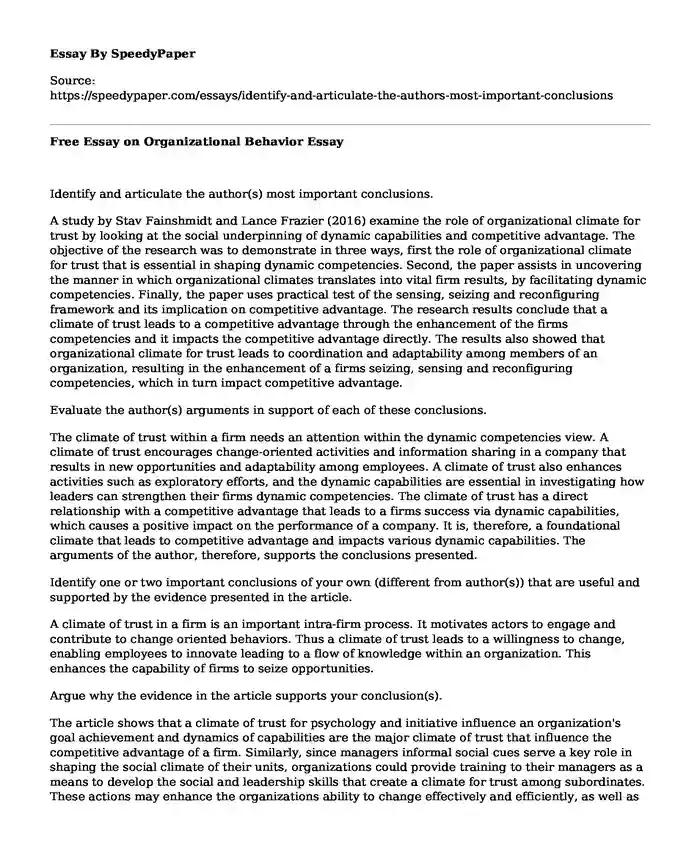
| Type of paper: | Essay |
| Categories: | Organizational behavior |
| Pages: | 3 |
| Wordcount: | 616 words |
Identify and articulate the author(s) most important conclusions.
A study by Stav Fainshmidt and Lance Frazier (2016) examine the role of organizational climate for trust by looking at the social underpinning of dynamic capabilities and competitive advantage. The objective of the research was to demonstrate in three ways, first the role of organizational climate for trust that is essential in shaping dynamic competencies. Second, the paper assists in uncovering the manner in which organizational climates translates into vital firm results, by facilitating dynamic competencies. Finally, the paper uses practical test of the sensing, seizing and reconfiguring framework and its implication on competitive advantage. The research results conclude that a climate of trust leads to a competitive advantage through the enhancement of the firms competencies and it impacts the competitive advantage directly. The results also showed that organizational climate for trust leads to coordination and adaptability among members of an organization, resulting in the enhancement of a firms seizing, sensing and reconfiguring competencies, which in turn impact competitive advantage.
Evaluate the author(s) arguments in support of each of these conclusions.
The climate of trust within a firm needs an attention within the dynamic competencies view. A climate of trust encourages change-oriented activities and information sharing in a company that results in new opportunities and adaptability among employees. A climate of trust also enhances activities such as exploratory efforts, and the dynamic capabilities are essential in investigating how leaders can strengthen their firms dynamic competencies. The climate of trust has a direct relationship with a competitive advantage that leads to a firms success via dynamic capabilities, which causes a positive impact on the performance of a company. It is, therefore, a foundational climate that leads to competitive advantage and impacts various dynamic capabilities. The arguments of the author, therefore, supports the conclusions presented.
Identify one or two important conclusions of your own (different from author(s)) that are useful and supported by the evidence presented in the article.
A climate of trust in a firm is an important intra-firm process. It motivates actors to engage and contribute to change oriented behaviors. Thus a climate of trust leads to a willingness to change, enabling employees to innovate leading to a flow of knowledge within an organization. This enhances the capability of firms to seize opportunities.
Argue why the evidence in the article supports your conclusion(s).
The article shows that a climate of trust for psychology and initiative influence an organization's goal achievement and dynamics of capabilities are the major climate of trust that influence the competitive advantage of a firm. Similarly, since managers informal social cues serve a key role in shaping the social climate of their units, organizations could provide training to their managers as a means to develop the social and leadership skills that create a climate for trust among subordinates. These actions may enhance the organizations ability to change effectively and efficiently, as well as facilitate the organizations competitive advantage (Fainshmidt & Frazier, 2016). This supports my conclusion because a climate of trust in a firm is an important motivator that engages and contributes to change oriented behaviors that lead to a firms competitive advantage by seizing innovative opportunities that influence a firms goal and achievement.
Provide an explanation of how the topic relates to organizational behavior using appropriate terminology.
A climate of trust needs to be the top priority in the business environment that demands strong cooperation, interaction and communication abilities. Managers need to change their leadership behavior to achieve a firms mission and vision as a dynamic leading to organizational success.
Reference
Fainshmidt, S., & Frazier, L. (2016). What Facilitates Dynamic Capabilities? The Role of Organizational Climate for Trust. Long Range Planning, 1-16.
Cite this page
Free Essay on Organizational Behavior. (2019, Nov 12). Retrieved from https://speedypaper.net/essays/identify-and-articulate-the-authors-most-important-conclusions
Request Removal
If you are the original author of this essay and no longer wish to have it published on the SpeedyPaper website, please click below to request its removal:
- Project Management Free Essay: Gantt Chart Example
- Free Essay with the Ad Rhetorical Review
- Writing Essay Example
- Free Essay Example on Internet Business
- Essay Sample on Drug Testing Recipients
- Exporting to Kenya and Vietnam - Essay Example about Export
- Essay Sample on Post-Hip Fracture Rehabilitation for Patients at Home
Popular categories




